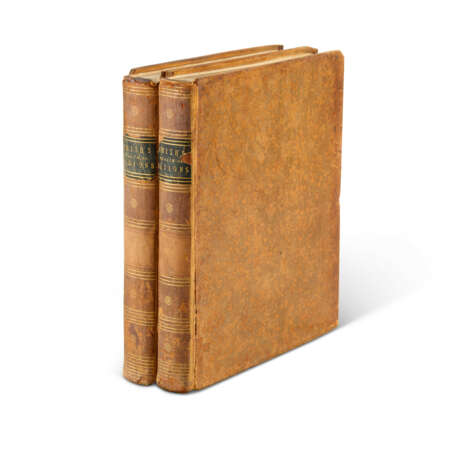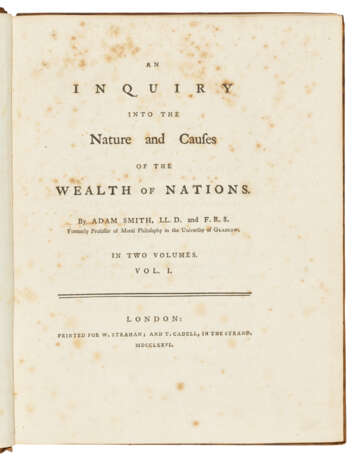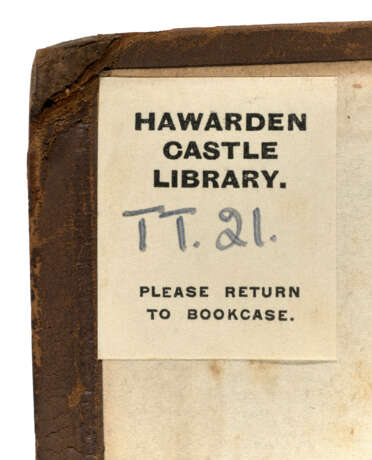ID 1249831
Lot 162 | SMITH, Adam (1723-1790)
Estimate value
£ 70 000 – 100 000
An Inquiry into the Nature and Causes of the Wealth of Nations. London: W. Strahan and T. Cadell, 1776.
Prime Minister William Gladstone’s copy of the first edition of the ‘greatest classic of modern economic thought' (PMM).
Smith's Wealth of Nations is the first major expression of the theory of free trade, of which Gladstone is one of British history’s most famous proponents. Whilst Chancellor of the Exchequer, Gladstone ‘effectively brought free trade to Britain by eliminating all protective duties' (Johnson) in a series of budgets which ‘helped seal a new social contract between government and people around a self-limiting state’ (Trentmann). On 13 May 1876, at a meeting to celebrate the centenary of the publication of The Wealth of Nations, Gladstone summarized his deep appreciation for Smith’s work by reminding his fellow members of the Political Economy Club that ‘the operations of commerce are not confined to the material ends; that there is no more powerful agent in consolidating and in knitting together the amity of nations; and that the great moral purpose of the repression of human passions, and those lusts and appetites which are the great cause of war, is in direct relation with the understanding and application of the science [of political economy] which you desire to propagate’ (quoted in Schreuder).
Exalted equally as a compassionate conservative and sympathetic liberal, Smith propounds individual liberty and the accumulation of wealth, while arguing strongly for moral fairness and a duty to society. He describes a system of natural liberty and justice which strives towards improvement in the living standards of the population at large, equating higher wages with a healthier and more productive workforce. He illustrates his belief that the limits to growth are political, not economic, and sets out principles to guide legislators. Goldsmiths' 11392; Grolier, English 57; Kress 7261; PMM 221; Rothschild 1897. Johnson, The Wealth of a Nation: A History of Trade Politics in America, 2018; Schreuder, ‘Gladstone’s “Greater World”: Free Trade, Empire, and Liberal Internationalism’, in: Quinault, ed., William Gladstone: New Studies and Perspectives, 2016; Trentmann, Free Trade Nation, 2008.
Two volumes, quarto (280 x 220mm). With the final blank in vol. I, adverts printed on verso of last leaf in vol. II, and with cancels M3, Q1 U3, 2Z3, and 3A4 in vol. I (lacking the half-title in vol. II, tiny hole affecting shoulder note on Q3 of vol. I, some faint spots). Contemporary marbled calf, spines gilt, green morocco lettering pieces gilt (head and tailcaps chipped, lacking lower lettering pieces, slightly rubbed, some splitting to joints with upper board of vol. II almost detached). Provenance: William Ewart Gladstone, Prime Minister (1808-1898; Hawarden Castle library label) – by descent to the present owner.
| Place of origin: | Northern Europe, Europe, United Kingdom |
|---|---|
| Auction house category: | Books and manuscripts, Printed books |
| Place of origin: | Northern Europe, Europe, United Kingdom |
|---|---|
| Auction house category: | Books and manuscripts, Printed books |
| Address of auction |
CHRISTIE'S 8 King Street, St. James's SW1Y 6QT London United Kingdom | |
|---|---|---|
| Preview |
| |
| Phone | +44 (0)20 7839 9060 | |
| Buyer Premium | see on Website | |
| Conditions of purchase | Conditions of purchase |





